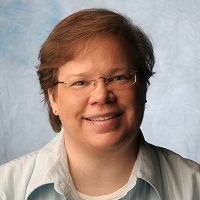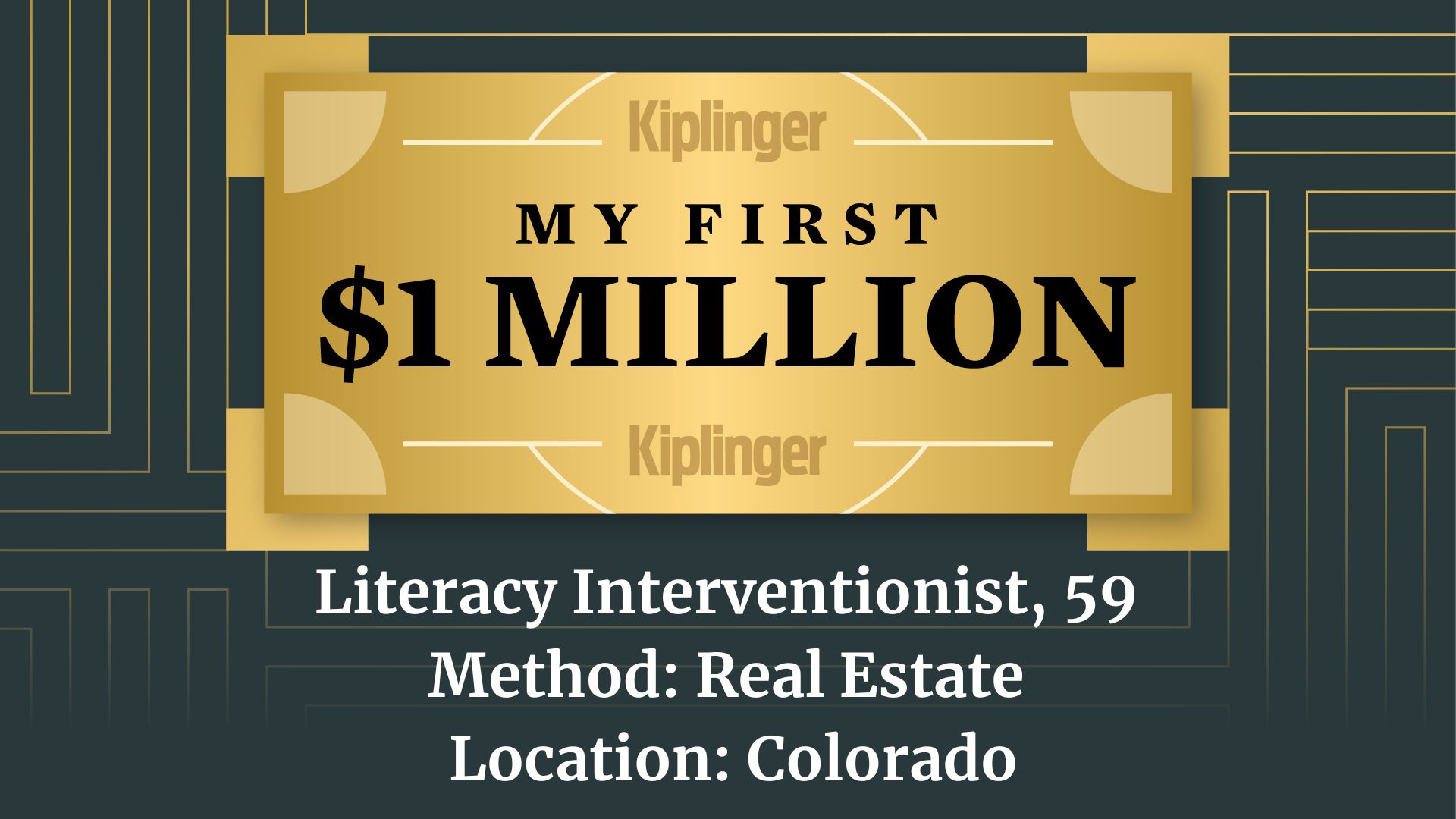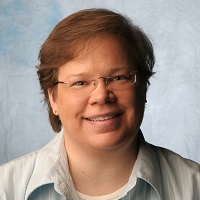My First $1 Million: Literacy Interventionist, 59, Colorado
"It was good timing. I feel fortunate that I invested my inheritance in real estate in our rapidly growing market."


Profit and prosper with the best of Kiplinger's advice on investing, taxes, retirement, personal finance and much more. Delivered daily. Enter your email in the box and click Sign Me Up.
You are now subscribed
Your newsletter sign-up was successful
Want to add more newsletters?

Delivered daily
Kiplinger Today
Profit and prosper with the best of Kiplinger's advice on investing, taxes, retirement, personal finance and much more delivered daily. Smart money moves start here.

Sent five days a week
Kiplinger A Step Ahead
Get practical help to make better financial decisions in your everyday life, from spending to savings on top deals.

Delivered daily
Kiplinger Closing Bell
Get today's biggest financial and investing headlines delivered to your inbox every day the U.S. stock market is open.

Sent twice a week
Kiplinger Adviser Intel
Financial pros across the country share best practices and fresh tactics to preserve and grow your wealth.

Delivered weekly
Kiplinger Tax Tips
Trim your federal and state tax bills with practical tax-planning and tax-cutting strategies.

Sent twice a week
Kiplinger Retirement Tips
Your twice-a-week guide to planning and enjoying a financially secure and richly rewarding retirement

Sent bimonthly.
Kiplinger Adviser Angle
Insights for advisers, wealth managers and other financial professionals.

Sent twice a week
Kiplinger Investing Weekly
Your twice-a-week roundup of promising stocks, funds, companies and industries you should consider, ones you should avoid, and why.

Sent weekly for six weeks
Kiplinger Invest for Retirement
Your step-by-step six-part series on how to invest for retirement, from devising a successful strategy to exactly which investments to choose.
Ever wonder how someone who's made a million dollars or more did it? Kiplinger's new My First $1 Million series uncovers the answers.
Welcome to the second installment of Kiplinger’s My First $1 Million, in which we hear from people who have made $1 million. They’re sharing how they did it and what they’re doing with it. This month, we hear from a 59-year-old elementary school literacy interventionist and professor of reading in Colorado. See our first profile, about a writer in New England.
Each profile features one person or couple, who will always be completely anonymous to readers, answering questions to help our readers learn from their experience.
From just $107.88 $24.99 for Kiplinger Personal Finance
Become a smarter, better informed investor. Subscribe from just $107.88 $24.99, plus get up to 4 Special Issues

Sign up for Kiplinger’s Free Newsletters
Profit and prosper with the best of expert advice on investing, taxes, retirement, personal finance and more - straight to your e-mail.
Profit and prosper with the best of expert advice - straight to your e-mail.
These features are intended to provide a window into how different people build their savings — they're not intended to provide financial advice.
The Basics
How did you make your first $1 million?
We made our first million in real estate, gradually, over time. In 2000, we owned a house and one rental property that we purchased from a family member. After I finished graduate school in 2005, and with three young children, we moved to an acreage in our small town of less than 15,000.
We tried to sell our current home, but the housing market was flat, so it didn’t sell. My father loaned us the money for the down payment for the new house, and this, I believe, is where our desire to increase our real estate portfolio began. We still own both of these properties.
Fast-forward to 2021 when we inherited two properties from my dad, and with the additional cash he left, we purchased three more properties in another town in Colorado during COVID when the interest rates were 3.375%.
In addition, I refinanced our existing rental properties and our primary home during this time. I would not recommend purchasing three properties and refinancing five others at the same time, but that’s what I did, and it worked for us.
We now own seven rental properties and have an Airbnb apartment that is part of an expansion that we did on our primary house in 2013. The growing population of Colorado over the past 20 years, along with the subsequent increase in housing prices and robust economy, is what put us over the $1 million mark.
I didn’t have a lot of foresight in doing any of this; it was good timing and following the advice of a real estate professional.
What are you doing with the money?
Our lifestyle has improved over the years, but we don’t do anything drastically different than before. We are focused on our money habits more so than spending:
- We have a monthly budget and go over it each month to refine it and make cuts where needed.
- We use a credit card that categorizes expenses — and offers cash back — to make tracking easier.
- We rent a portion of our home that would, otherwise, sit vacant.
All of these support our long-term goals of travel and leaving our children with a significant inheritance. We are not hanging out on a yacht and drinking champagne … yet.

THE FUN STUFF
Did you do anything to celebrate?
Because our money is invested in real estate, it’s more difficult to see our net worth since the markets fluctuate, and I’m not looking at the value daily.
In other words, I don’t have $1 million in the bank — it’s invested.
So, in all honesty, I don’t know exactly when we became millionaires.
What is the best part of making $1 million?
The best part of having money is knowing that my children will inherit our properties. We are also paying their student loans, so they won’t be burdened with crippling debt as young adults.
Did making $1 million change your life?
Making $1 million changed our lives in that we now have more freedom to do what we want and peace of mind that our children will benefit from it.
Any plans to retire early?
No, I will retire at 65. I’m trying to invest as much money as possible to pass along to our children.

LOOKING BACK
Anything you would do differently?
In retrospect, I feel that I may have purchased one too many properties, as our short-term cash flow has been impacted. However, I can always sell one of them if needed.
I feel fortunate that I invested my inheritance in real estate in our rapidly growing market.
Did you work with a financial adviser?
I’m working with Dave Rowan of Rowan Financial and a fee-only adviser on Wealthramp. He has been extremely helpful in planning our future and making reasonable and doable short-term recommendations that will impact us in the long term.
In particular, his expertise in real estate helps us make great decisions not only with our finances in general, but also with our investment properties. He’s very knowledgeable, personable and easy to work with.
Did someone help you early on?
My dad loaned us the down payment money that started our real estate portfolio.
What do you wish you’d known …
When you first started saving? I have never been good at saving money, and real estate naturally acts as a savings account in a growing market.
When you first started investing? I wish I would have known to buy early and as often as possible.
When you first started working with a financial professional? Prior to working with Dave Rowan, I worked with someone else who did not provide the information and expertise that Dave has. Dave has worked with us on budgeting, tracking monthly expenses and showing us how these short-term changes impact our long-term financial goals of having money to travel in retirement and passing our properties on to our children.

LOOKING AHEAD
Plans for your next $1 million?
I would like to travel more, and money allows us the freedom to do that.
Any advice for others trying to make their first $1 million?
Consult with experts in the field — financial adviser, real estate professional, accountant, attorney — early and often. Make sure that you are working with the best people in the business.
Do your research, ask around and interview these professionals to find the best fit. I was told early on by a mortgage lender that she could tell the difference between those who had an accountant, attorney and financial adviser from those who didn’t.
Invest in these people — they will change your outcome!
If you have made $1 million or more and would like to be anonymously featured in a future My First $1 Million profile, please fill out and submit this Google Form or send an email to MyFirstMillion@futurenet.com to receive the questions. We welcome all stories that add up to $1 million or more in your accounts, although we will use discretion in which stories we choose to publish, to ensure we share a diversity of experiences. We'll also want to verify that you really do have $1 million. Your answers may be edited for clarity.
Related Content
- My First $1 Million: Writer, 59, New England
- You're 62 Years Old With $1 Million Saved: Can You Retire?
- Want to Earn $1 Million More Over Your Lifetime? Do This
- Do You Have at Least $1 Million in Tax-Deferred Investments?
- Are You Rich? U.S. Net Worth Percentiles Can Provide Answers
Profit and prosper with the best of Kiplinger's advice on investing, taxes, retirement, personal finance and much more. Delivered daily. Enter your email in the box and click Sign Me Up.

As Contributed Content Editor for the Adviser Intel channel on Kiplinger.com, Joyce edits articles from hundreds of financial experts about retirement planning strategies, including estate planning, taxes, personal finance, investing, charitable giving and more. She has more than 30 years of editing experience in business and features news, including 15 years in the Money section at USA Today.
-
 Ask the Tax Editor: Federal Income Tax Deductions
Ask the Tax Editor: Federal Income Tax DeductionsAsk the Editor In this week's Ask the Editor Q&A, Joy Taylor answers questions on federal income tax deductions
-
 States With No-Fault Car Insurance Laws (and How No-Fault Car Insurance Works)
States With No-Fault Car Insurance Laws (and How No-Fault Car Insurance Works)A breakdown of the confusing rules around no-fault car insurance in every state where it exists.
-
 7 Frugal Habits to Keep Even When You're Rich
7 Frugal Habits to Keep Even When You're RichSome frugal habits are worth it, no matter what tax bracket you're in.
-
 No-Fault Car Insurance States and What Drivers Need to Know
No-Fault Car Insurance States and What Drivers Need to KnowA breakdown of the confusing rules around no-fault car insurance in every state where it exists.
-
 7 Frugal Habits to Keep Even When You're Rich
7 Frugal Habits to Keep Even When You're RichSome frugal habits are worth it, no matter what tax bracket you're in.
-
 Why Picking a Retirement Age Feels Impossible (and How to Finally Decide)
Why Picking a Retirement Age Feels Impossible (and How to Finally Decide)Struggling with picking a date? Experts explain how to get out of your head and retire on your own terms.
-
 The Best Precious Metals ETFs to Buy in 2026
The Best Precious Metals ETFs to Buy in 2026Precious metals ETFs provide a hedge against monetary debasement and exposure to industrial-related tailwinds from emerging markets.
-
 For the 2% Club, the Guardrails Approach and the 4% Rule Do Not Work: Here's What Works Instead
For the 2% Club, the Guardrails Approach and the 4% Rule Do Not Work: Here's What Works InsteadFor retirees with a pension, traditional withdrawal rules could be too restrictive. You need a tailored income plan that is much more flexible and realistic.
-
 Retiring Next Year? Now Is the Time to Start Designing What Your Retirement Will Look Like
Retiring Next Year? Now Is the Time to Start Designing What Your Retirement Will Look LikeThis is when you should be shifting your focus from growing your portfolio to designing an income and tax strategy that aligns your resources with your purpose.
-
 I'm a Financial Planner: This Layered Approach for Your Retirement Money Can Help Lower Your Stress
I'm a Financial Planner: This Layered Approach for Your Retirement Money Can Help Lower Your StressTo be confident about retirement, consider building a safety net by dividing assets into distinct layers and establishing a regular review process. Here's how.
-
 Stocks Sink With Alphabet, Bitcoin: Stock Market Today
Stocks Sink With Alphabet, Bitcoin: Stock Market TodayA dismal round of jobs data did little to lift sentiment on Thursday.